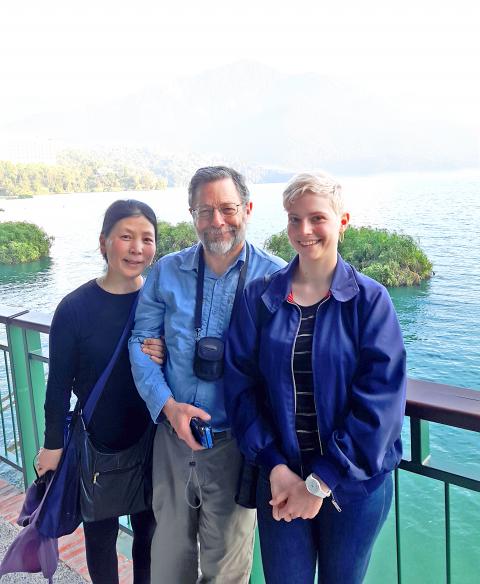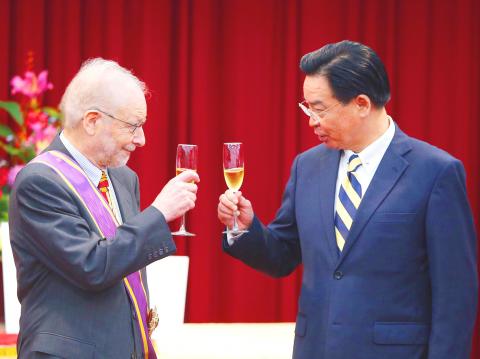J. Bruce Jacobs, the American-born Australian academic who was a giant of Taiwan scholarship, recipient of top civilian awards from the Taiwanese and Australian governments and a regular Taipei Times contributor, died yesterday afternoon in Melbourne after a years-long battle with cancer, a friend of the family told the newspaper.
The 76-year-old Jacobs first came to Taiwan in 1965 as a postgraduate student in history at National Taiwan University after earning his bachelor’s degree from Columbia University. He returned to Columbia in 1966 to pursue a master’s degree, which was awarded in 1970, and then returned to Taiwan in 1971 to conduct research for his doctorate, staying until 1973.
After earning his doctorate from Columbia in 1975, Jacobs in 1976 became a lecturer in politics at La Trobe University in Melbourne, going on to become chair in Asian studies in 1988 and founding director of its Institute of Asian Studies the following year.

Photo courtesy of Martin Williams
He also taught at Nanjing University in the late 1980s.
In 1991, he was hired by Monash University as a professor of Asian languages and studies, and over the years held several leadership positions in that department, including as director of its Taiwan Research Unit.
In 2014, he became emeritus professor of Asian languages and studies at the university.

Photo: Liao Chen-huei, Taipei Times
In addition to his research and writings on Taiwan and China, Jacobs earned his own footnote in Taiwanese history after the Feb. 28, 1980, murders of the mother and twin daughters of then-jailed provincial assemblyman Lin I-hsiung (林義雄) and the attempted murder of his third daughter, while Lin was jailed awaiting trial on charges of insurrection for helping organizing the Dec. 10, 1979, demonstration against the then-Chinese Nationalist Party (KMT) government, an event that became known as the Kaohsiung Incident.
Jacobs was a friend of the family and although Lin’s home in Taipei was under 24-hour surveillance, the government accused Jacobs of being involved in the murders and he was placed under “police protection” for three months and barred from leaving Taiwan.
After he was allowed to return to Australia, he was placed on the KMT government’s blacklist and barred from returning to Taiwan for 12 years.

Photo: CNA
Jacobs wrote about the experience in his 2016 book, The Kaohsiung Incident in Taiwan and Memoirs of a Foreign Big Beard, a reference to his local nickname, “Big Beard.”
On Nov. 16 last year, Minister of Foreign Affairs Joseph Wu (吳釗燮) awarded Jacobs the Order of Brilliant Star with Grand Cordon at a ceremony at the Ministry of Foreign Affairs in Taipei in recognition of his contributions to democratization and human rights in Taiwan.
Wu said that Jacobs had not only made “exceptional contributions to the people of Taiwan,” but was also “part of Taiwan’s history.”
On June 10, Jacobs was made a Member of the Order of Australia for his significant service to higher education, particularly in the field of Asian studies.
Jacobs’ wife, Kim Jung-sim, and his daughters Melanie, Ruth and Stephanie, were with him when he died at the family home, the Taipei Times’ source said.

Super Typhoon Kong-rey is the largest cyclone to impact Taiwan in 27 years, the Central Weather Administration (CWA) said today. Kong-rey’s radius of maximum wind (RMW) — the distance between the center of a cyclone and its band of strongest winds — has expanded to 320km, CWA forecaster Chang Chun-yao (張竣堯) said. The last time a typhoon of comparable strength with an RMW larger than 300km made landfall in Taiwan was Typhoon Herb in 1996, he said. Herb made landfall between Keelung and Suao (蘇澳) in Yilan County with an RMW of 350km, Chang said. The weather station in Alishan (阿里山) recorded 1.09m of

STORM’S PATH: Kong-Rey could be the first typhoon to make landfall in Taiwan in November since Gilda in 1967. Taitung-Green Island ferry services have been halted Tropical Storm Kong-rey is forecast to strengthen into a typhoon early today and could make landfall in Taitung County between late Thursday and early Friday, the Central Weather Administration (CWA) said yesterday. As of 2pm yesterday, Kong-Rey was 1,030km east-southeast of Oluanpi (鵝鑾鼻), the nation’s southernmost point, and was moving west at 7kph. The tropical storm was packing maximum sustained winds of 101kph, with gusts of up to 126 kph, CWA data showed. After landing in Taitung, the eye of the storm is forecast to move into the Taiwan Strait through central Taiwan on Friday morning, the agency said. With the storm moving

NO WORK, CLASS: President William Lai urged people in the eastern, southern and northern parts of the country to be on alert, with Typhoon Kong-rey approaching Typhoon Kong-rey is expected to make landfall on Taiwan’s east coast today, with work and classes canceled nationwide. Packing gusts of nearly 300kph, the storm yesterday intensified into a typhoon and was expected to gain even more strength before hitting Taitung County, the US Navy’s Joint Typhoon Warning Center said. The storm is forecast to cross Taiwan’s south, enter the Taiwan Strait and head toward China, the Central Weather Administration (CWA) said. The CWA labeled the storm a “strong typhoon,” the most powerful on its scale. Up to 1.2m of rainfall was expected in mountainous areas of eastern Taiwan and destructive winds are likely

The Central Weather Administration (CWA) yesterday at 5:30pm issued a sea warning for Typhoon Kong-rey as the storm drew closer to the east coast. As of 8pm yesterday, the storm was 670km southeast of Oluanpi (鵝鑾鼻) and traveling northwest at 12kph to 16kph. It was packing maximum sustained winds of 162kph and gusts of up to 198kph, the CWA said. A land warning might be issued this morning for the storm, which is expected to have the strongest impact on Taiwan from tonight to early Friday morning, the agency said. Orchid Island (Lanyu, 蘭嶼) and Green Island (綠島) canceled classes and work